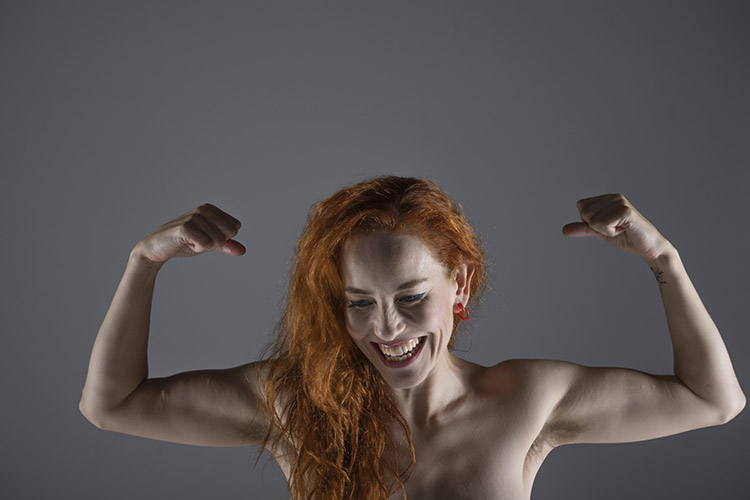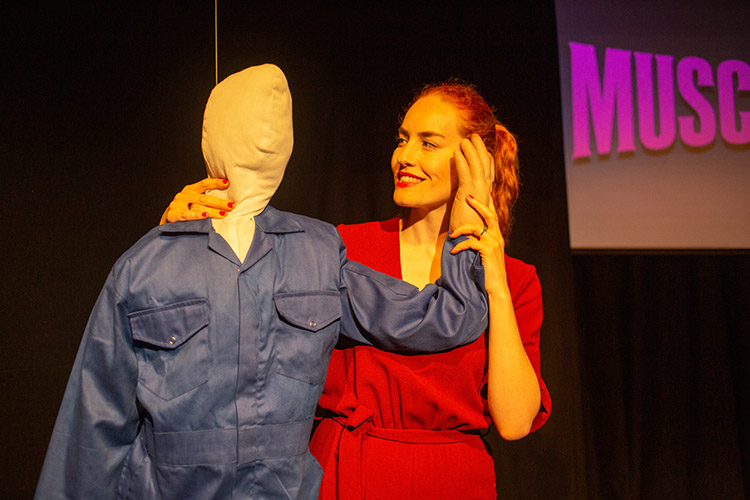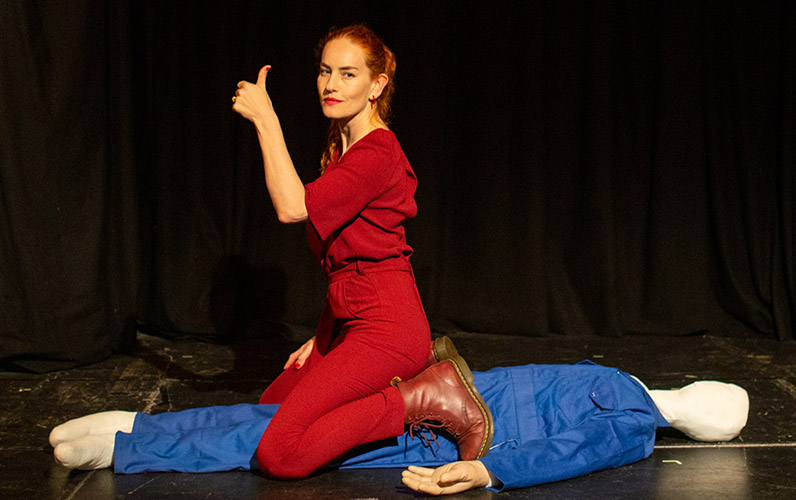Dr. Rosy Carrick is a writer, performer, actor and translator. In her multi-award-winning theatre debutPassionate Machine, feminist powerhouse, she became the world’s first female time-travelling doctor. In her new show, she is Musclebound to examine our most shameful sexual secrets. The show is undertaking an extensive UK tour in March including a performance in her former hometown at Norwich Theatre’s Stage Two on 9 March. Hayley Clapperton had the chance to explore the topic with Rosy:

HC: The press release for your show ‘Musclebound’ sounds like you’re finally admitting to a secret life-long fetish – is this true?
RC: It is true that in the show I talk about my lifelong fetish for watching hyper-muscular 80s action heroes being tortured by their male antagonists, but the show isn’t about me admitting to that. Or, at least, that’s a very small part of it. I did feel ashamed of the tortured beefcake fetish as a young child, but I don’t have any shame around that at all now! Musclebound is essentially split into two strands, and the impetus for both those strands is my daughter Olive reaching the age I had been when I first had sex, and embarking on her first relationship. In one strand, I am actively exploring the politics of those odd – and extremely homoerotic – dynamics; and in the second I am retracing each stage of my own sexual development. From my early childhood love of He-Man and Conan, to my first experiences of sex and masturbation, to my adult sex life – elements of which I have always been very transparent about onstage, to being the mother of a teenager. And now being a woman in my forties, looking back at this trajectory and wondering why it is that the most sexually powerful time of all for me was that very early phase. A secret erotic muscleman fascination that predated my knowledge of sex at all.
The in-show Rosy assumes these two strands are one and the same issue: that my sex life had been unsatisfying because I had never pursued this (very niche) fetish before, and so she pushes and pushes to try to make it work for her. Meanwhile poor Olive is trying to (and failing) to get advice on her own sexual quest. But the reality that unfolds is something very different: a secret that, for me – both in the show and in real life – has been far more shameful to accept than fancying tortured beefcake. I won’t talk about that here because I don’t want to ruin the show.
HC: How does the tortured beefcake scenario link to female pleasure?
RC: The muscular men in those scenes are presented in a way that usually only women are presented. Their bodies are waxed and oiled, their clothes are minimal and their bodies are really intensely lingered over by the camera. The films invite their audiences to objectify men, but – crucially – they never rob the men of their power while doing so.
On the contrary, these films act as vehicles for reinforcing macho strength: often these men offer themselves up for punishment for the sake of a loved one or a community, they take their punishment stoically and then they find a way to escape. By comparison, when women get tortured in films it is generally a way to demonstrate their weakness (they invariably are either killed, or they must be rescued from “bad” men by “good” men. It becomes about the triangulation of male dominance again, only this time with women as the pawn). So, sure, the muscle men are put in submissive situations, but it’s a performance of weakness that comes from an intrinsic place of power, and this is one of the ways it links to female pleasure.
HC: What do you think the male audience member will think of the show?
RC: Male audiences love it. It is a really laugh-out-loud funny, obsessive, madcap adventure that follows my increasingly absurd and shameless attempts to get my hands on some of the power that those old muscle films sparked in me in my youth – even if that means going to Arnold Schwarzenegger himself for answers. There are elements of the show that will speak directly to female experience but, as a whole, it’s a show for everyone.
HC: How do we get the male of the species to want to come to the show? What takeaway from the show can you lure them in with?
RC: In Edinburgh I actually had a male-heavy audience a lot of the time, so the struggle there was trying to come up with ideas to get more women to come along! I had to rewrite the blurb to make it clearer what the key themes of the show were, because I think a lot of women assumed a show about all-male torture scenes in 80s action films was not for them. I had been leaning on that element a lot in the promo, because I was afraid that if I spoke more openly about the mother-daughter relationship that is at the heart of the show, and the very female-focussed pursuit of sexual pleasure, men would be put off. They haven’t been! And why should they be?
As women, we spend our whole lives watching films, reading books, going to shows that feature male protagonists and male experience. No one ever says “how do we get the female of the species to want to watch The Revenant, or Oppenheimer”. I think we should give men more credit: so far they have really enthusiastically come along to my show, and have taken from it exactly what women have: the value of being shameless, honest and open about desire and sexuality.
HC: Now the show is ready, do you really think you would have wanted to have seen it as a teenager? Isn’t there something to be said about the innocence of youth?
RC: In my experience, trying to preserve “the innocence of youth” amounts to withholding vital information that is necessary to feel confident and empowered during those years. I had a friend at school whose parents didn’t tell her anything about periods because they wanted to “preserve her innocence”. When she got her first one she was terrified – she thought she was bleeding to death. Likewise, like most pubescent girls, I started to masturbate in my teens. At that time, there was literally nothing in the way of education or cultural representation on the subject of female masturbation.
This had a huge impact on me: it turned my perfectly natural activity into a shameful secret; and this, in turn, stopped me from sharing what I learned about my own body with future sexual partners. Instead, like many young women, I went along with models of sex that didn’t do much for me. That was the only thing I ever saw in mainstream culture, and that’s what felt good for the boys I was having sex with, so I assumed, if I didn’t enjoy it, there must be something wrong with me. It was extremely harmful then, and all the more so now because pornography is so readily available.

The sad fact is that most young people’s first introduction to sex is through watching porn, and porn caters almost exclusively to male pleasure and desire. If teenagers are watching women perform pleasure for men while being subjected to acts that are – at best – not focussed on their own pleasure and at worst are degrading and dehumanising, we urgently need to provide some context and counterpoint information to that.
In Denmark, “sexuality education” includes teaching children from an early age about anatomy, respecting others’ bodies and getting to know your own through masturbation. Of course, this is done in an age-appropriate way but they start it young precisely to reinforce the idea that sexual transparency and pleasure is normal, healthy and natural. The idea that sexual information is antithetical to “innocence”; that it is somehow “tainting” is just a toxic hangover from Victorian times, and the sooner we wash our hands of it the better.
That’s what I’m trying to do with this show, and I think that if teenage Rosy could have seen a confident adult woman talking candidly about things she knew to be true but that she had never seen spoken out loud before, then the next twenty years of her sexual life would have been a lot more pleasurable and powerful than they were in reality!
HC: What do you think current teenagers will think? Would you advise them to come along with their parents, or their mates?
RC: I guess it depends what kind of relationship they have with their parents. A lot of teenagers have come to see it with their mothers, and one woman emailed me afterwards to say that she had never been able to discuss orgasms with her daughter before (the daughter had shrivelled away in embarrassment!), but that after seeing my show together, she had opened right up and they’d had some really important discussions.
But I don’t know if I would have felt comfortable seeing it with my mum – we didn’t have any open conversations around sex at all when I was growing up. This is why it felt so important for me to be extra open with my own daughter. And, sure, it takes practice to stop feeling awkward, but it’s possible! But whether it’s with friends or parents, I think current teenagers will get a lot out of the directness and honesty of it.

We live in a society now which is a lot more sex positive than when I was growing up, but certain things are still very taboo. When my daughter Olive first had sex – and found it a lot less exciting than she had anticipated – she went to her friends, who had all been talking in great excitement about the sex they’d been having, and said “but… did you actually have an orgasm? And if so, how?” They all were forced to admit that no, they hadn’t. They all thought it was just them. Openness and frank conversation is powerful, and that’s what I want to encourage among teenagers (and adults too!)
HC: What elements are key for you to make this production really work?
RC: It is a very fun, active, sexy show, but there are parts of it that also require a lot of vulnerability from me, and genuine connection with the audience. I am used to being confident onstage – I’ve been a performer for over 20 years – so to lean into vulnerability rather than to shy away from it or cover it up has been tough, but it’s what makes the final message of the show so powerful.
HC: How did you find the process of writing for the show?
RC: I found it extremely hard, to be honest. In fact, I nearly cancelled it a couple of times because I was becoming so demoralised! On the surface of it, the elements I am connecting seem very unlikely, and they were hard to wrangle together because although I knew there was a connection, and I felt it very keenly, but bringing them together in a way that was clear, and not heavy-handed, and which took into account Olive’s experiences too, took a lot of painstaking work. It wasn’t helped by the fact that – at that time – I was preparing to share some extremely exposing things about myself for the first time ever, so it felt very urgent for it to be told well, and not to leave me feeling too anxious and exposed! I was so glad to have Katie Bonna as dramaturg and director. She is extremely intelligent, insightful, sensitive and capable, as well as being an experienced and award-winning theatre-maker herself. She also worked with me on my first play Passionate Machine, so I knew I could trust her!
HC: What was your first experience of the theatre / tell me about your first theatre experience
RC: I acted in a pantomime at a theatre in New Mills (in Derbyshire) when I was a child. I only had a tiny role, but the magic of it, the atmosphere backstage, the make-up, the terror, the stage lights, the feel of it all was mesmerising to me. I remember very clearly being totally distraught when the run ended. I wrote in my diary that night: I would rather miss every birthday and Christmas for the rest of my life than never do this again. I was about 12 at the time. I often think of that Rosy when I’m about to go on stage now, although as an adult I fucking hate pantomime! I used to have to get other parents to take Olive when she was young – I couldn’t hack it myself.
HC: Do you have any top tips for any aspiring playwrights?
RC: Don’t dilute your ideas in an attempt to appeal to a broader audience. The best shows I have seen are the most singular ones; the ones where bizarre thoughts and characters are given space to develop. I love Theodora Van der Beek’s work for this reason. Her last show Ram of God was incredible.
HC: What’s your favourite thing about Norfolk?
RC: I love the higgledy piggledy old architecture, and the huge skies over the broads. I lived in Norwich for a year and it’s a beautiful city. My daughter is at university there now, so I go back to visit quite often.
HC: Do you have other stuff going on at the moment or can you concentrate on this project?
RC: For the last two years I’ve been working on a video game with za/um, the creators of Disco Elysium. I’m stepping away from that now, so after the tour I’ll be focussing on my next poetry collection and a collection of never-before-translated children’s poems by Mayakovsky – both of which are projects I had to shelve because of the game writing and tour preparation, so I’m really looking forward to jumping back in!
Thank you so much for your time Rosy, it’s been fascinating. Good luck with the show.
Show photo credit: Sharon Kilganno
Press photo Credit: Andre Pattenden